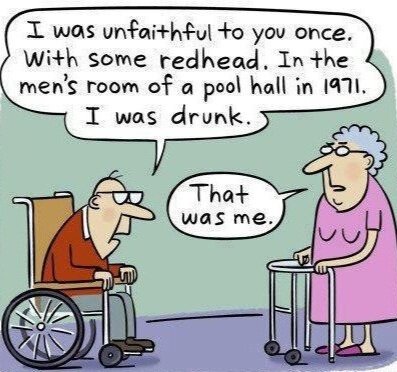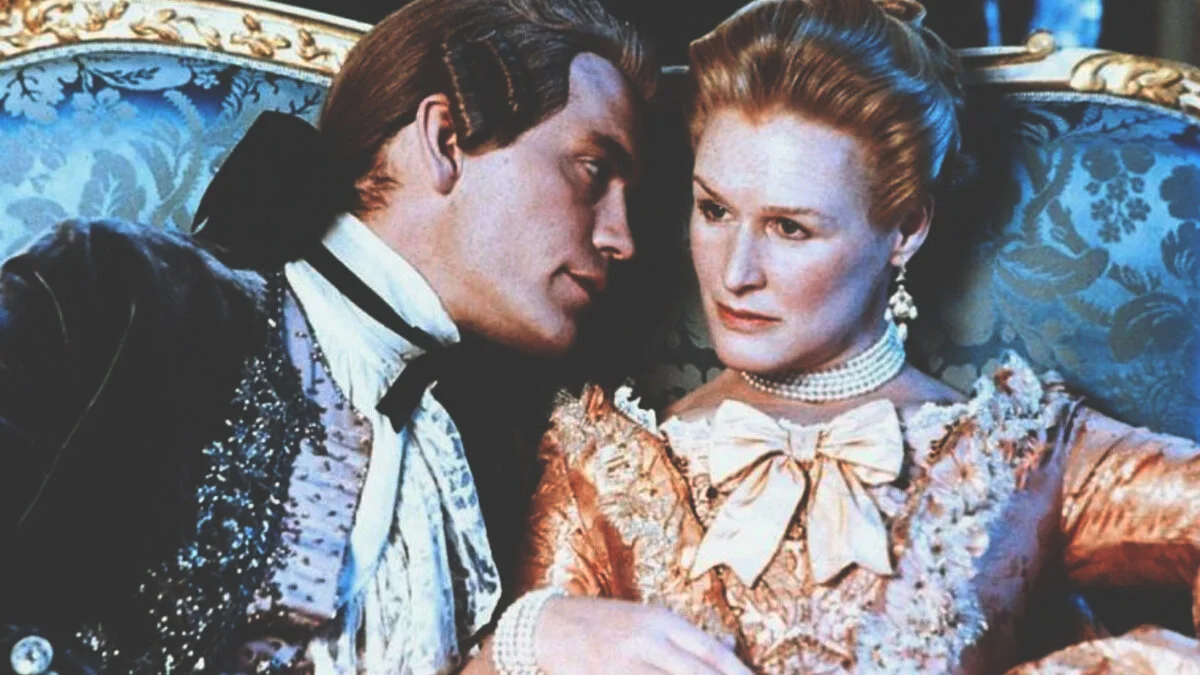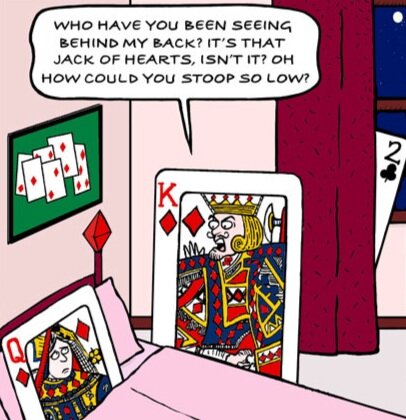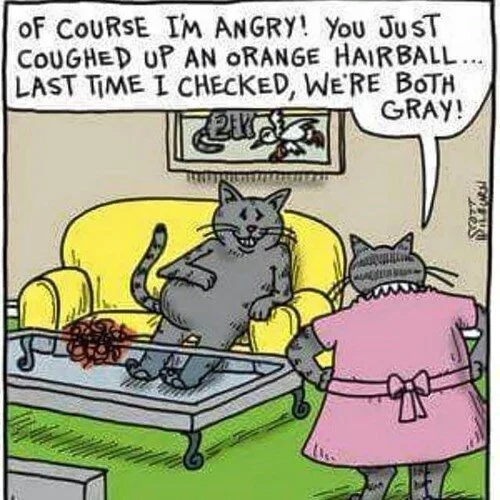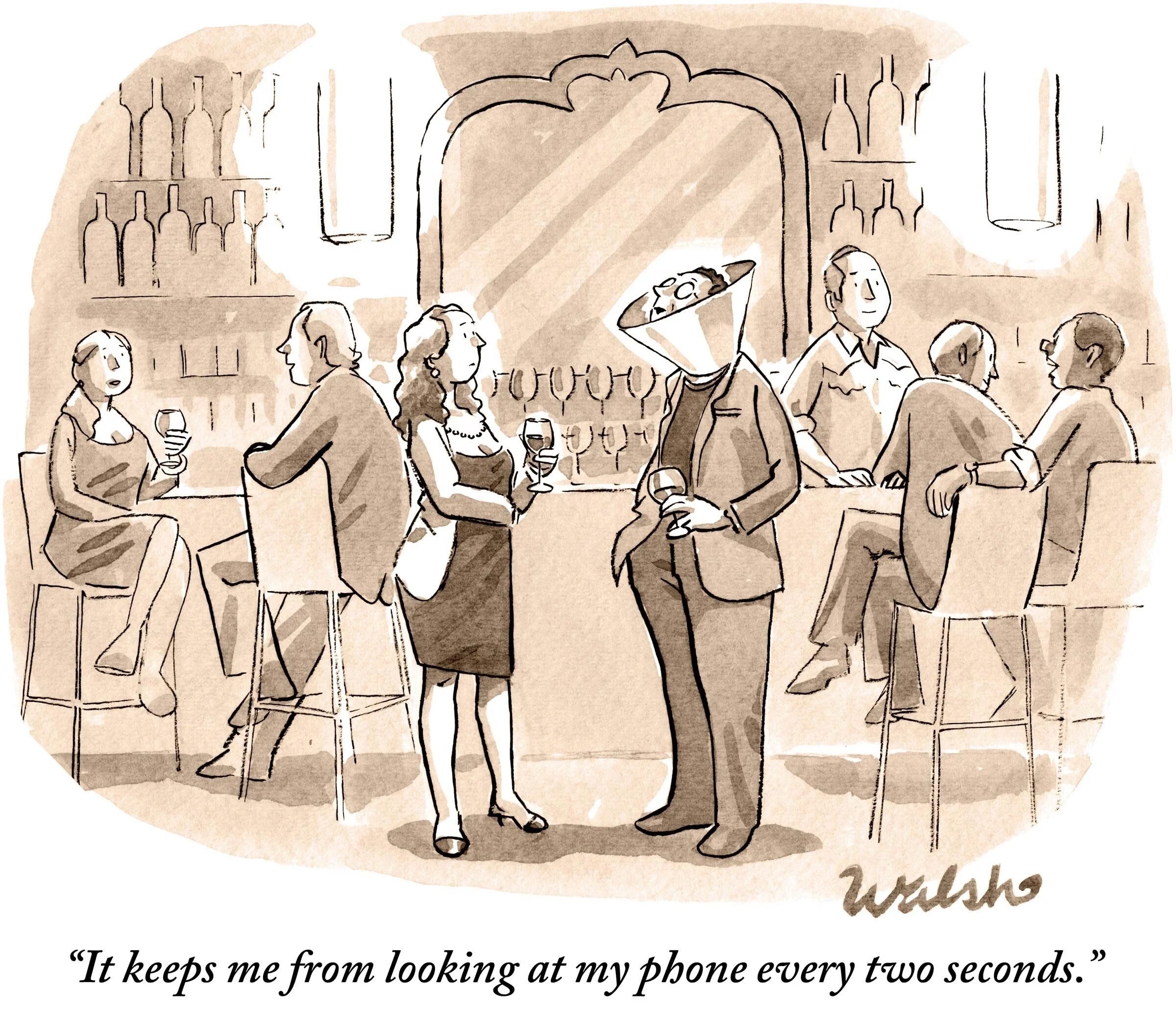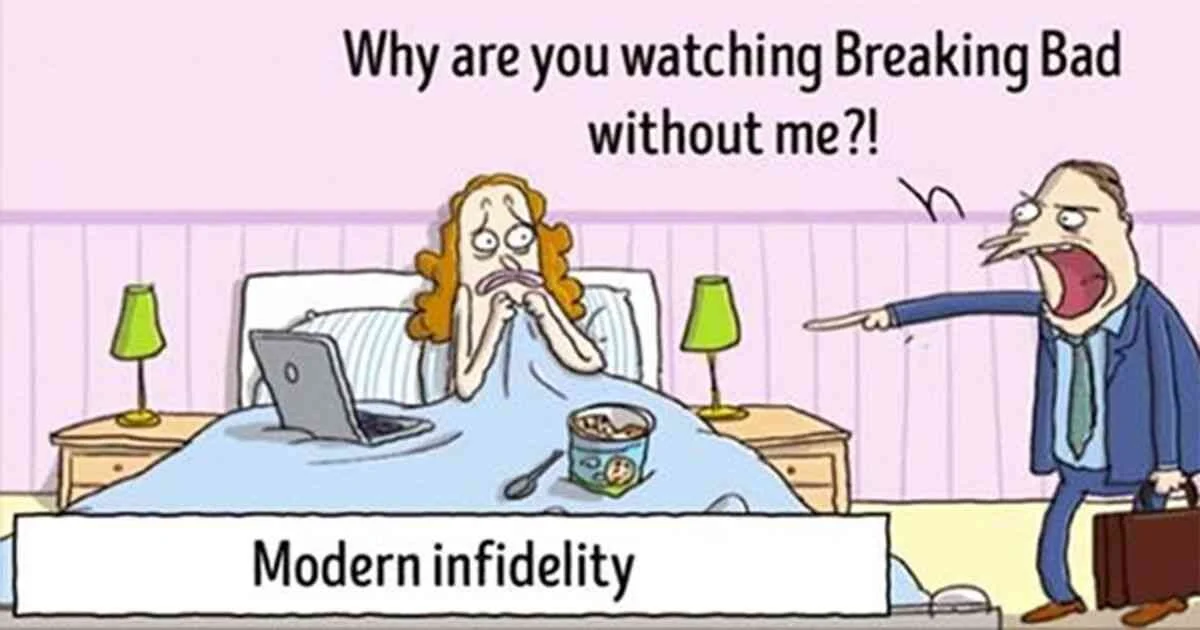By The Landlord
“Deceiving others. That is what the world calls a romance … Those who are faithful know only the trivial side of love: it is the faithless who know love's tragedies.” – Oscar Wilde
“The cruelest lies are often told in silence.” – Robert Louis Stevenson
“Her heart raced with joy to sleep with War.” – Homer, The Odyssey
“A truth that’s told with bad intent beats all the lies you can invent.” – William Blake
“Sigh no more, ladies, sigh no more,
Men were deceivers ever,
One foot in sea, and one on shore,
To one thing constant never.” – Shakespeare, Much Ado About Nothing
“You may wear her in title yours: but, you know, strange fowl light upon neighbouring ponds.” – Shakespeare, Cymbeline
“Why go out for hamburger when I can have steak at home?” – Paul Newman
"I cheated myself, like I knew I would.
I told you I was trouble – you know I'm no good.” – Amy Winehouse
It rarely ends well. Although it might result in a great art, a story, or a song, because all the ingredients are there – the excitement, the guilt, the extreme passions, the ironies, the sexiness of secrecy and risk, the partial or unfolding perspectives, the drama, and then, either a repressed, frustrated or possibly romantic ending, or the full tragic, explosive reveal.
Confession time. I’ve was once involved in adultery. It was during my free-and-single mid-twenties. She was the married one – a dizzying, wild beauty with long red locks, and 10 years older. We had met at a creative writing group, which then continued on in the pub, and as the evening wore on, after an enigmatic smile and squeeze past on the way to the bar, and an accidental brush of knee, I felt that something was afoot. I don’t know what started it, perhaps a good joke, or a turn of phrase, but somehow, and suddenly, it was only us left in the snug, and with the conversation still flowing, we had one more for the road. Then, staggering a little out onto the street, came a polite farewell, which suddenly tumbled into a kiss.
And so it went from there. Stolen moments that went from the brief and coy to outrageous and passionate. Her writing morphed into clever creativity about what, on each occasion she would be telling her husband – meeting this friend or that, going to this class or that, while he was working or at home. They had two young children, both at school, so it must have been a nightmare of planning. But she assured me that, despite the wracked guilt, it was helping her improve her flatlined, barely functioning marriage and banal home life. Whether or not that was true I wasn’t sure, but she was certainly deliriously happy and reinvigorated when we were together, and who was I to complain?
Our meetings could mostly only be couple of snatched hours at my place, but also all kinds of exciting rendezvous arrangements - art galleries with opulent restrooms, the very quiet sections of libraries, even going full on outdoors in park woodlands, but eventually it had to end, simply because of the practical impossibility of it all. Our final clothes-ripping dalliance took place, of all places, in a night-train sleeper compartment, pulling out of Euston station, one for which I did not even have a ticket. Now that’s a metaphor in itself. It could not have been more romantic, that is, unless the engine had been powered by steam.
And so then this week, we turn our attention to what could be a vast topic, one that certain has added fanned the flames and turned the wheels of many songwriters’ passions and work. And following on from last week’s songs about underwear, it seems highly appropriate.
We’re not restricted to the conventions of marriage, just to within established relationships, so cheating, jealousy, infidelity all count, and have all inevitably come up in the past elsewhere, but there’s so much more to suggest as this topic is brimful with emotions and scenarios that make up great songs. Any quoted ones here have previously been picked, but that shouldn’t dim your passion.
Though it’s best to be careful when, one is, as TS Eliot put it “mixing memory and desire”, as when it comes to affairs, or songs about them, it can need a check:
Mixing memory with desire …
So then, several of the artists from previously picked songs are here to tell their stories. And infidelity need not be confined the boundaries of marriage. “Your friends tell you it's no future, In loving a married man, If I can't see you when I want to, I’ll see you when I can. If loving you is wrong, I don't wanna be right,” says Millie Jackson.
And Millie’s having a drink with Irma Thomas, who is adamant that whoever Millie has an affair with, she’s OK with that, even her own husband, but, under no circumstance it should ever be with her boyfriend. Why? Well, they say the key to a man’s heart is through her stomach, but whatever her lover is doing for her, the food of love is also working.
“You can have my husband, but please don't mess with my man
I'm tellin' all you women, I want you all to understand
When my husband get paid, he feed me red beans and rice
My man feed me steaks, now, ain't that nice?”
Hank Williams rocks up too, slinging his guitar over his shoulder, and with a gentle croon, and chides the ladies for their talk of infidelity. But at the same time is is also addressing himself?
“Your cheatin' heart will make you weep
You'll cry and cry and try to sleep
But sleep won't come
The whole night through
Your cheatin' heart will tell on you.”
And in walks Agnetha Fältskog, who has surely experienced all the inter-band marriage problems one can imagine with the two doomed pairings of her with Björn, and Benny with Anna-Frid. In one song the entire story arc is told with a subtle perspectives, with glances and hidden frowns glances in the video. Does the “winner” take it all? Of course not.
“I was in your arms thinking I belonged there
I figured it made sense, building me a fence
Building me a home, thinking I'd be strong there
But I was a fool, playing by the rules
But tell me does she kiss like I used to kiss you?
Does it feel the same when she calls your name?
Somewhere deep inside you must know I miss you
But what can I say rules must be obeyed …”
But what are the rules, and from whose perspective? Throughout history, the rules seem to be different depending on who you are, with the weight of advantage often especially in favour of men. “Wise married women don't trouble themselves about infidelity in their husbands,” said Samuel Johnson.
So whether mistresses or lovers or wives and husbands, social conventions allow or disallow all kinds of behaviour, depending on discretion and status and gender. In perhaps one of the cleverest of plays and feature films on this very subject, is Christopher Hampton's screenplay for Stephen Frears’ film of1988 Dangerous Liaisons, based on his 1985 play Les liaisons dangereuses, itself adapted from the 1782 French novel of the same name by Pierre Choderlos de Laclos.
Dangerous games …
Glenn Close’s character, the clever Marquise de Merteuil, plays on a fatal feud with her ex-lover, the Comte de Bastide (John Malkovitch), and describes the game of infidelity in which she turns her disadvantages to complete control:
“When I came out into society, I was fifteen. I already knew that the role I was condemned to, namely to keep quiet and do what I was told, gave me the perfect opportunity to listen and observe. Not to what people told me, which naturally was of no interest, but to whatever it was they were trying to hide. I practiced detachment. I learned how to look cheerful while, under the table, I stuck a fork into the back of my hand. I became a virtuoso of deceit.”
While it ends badly, cheating game for these characters is all about the thrill of the poker face, just like in a game of cards.
Cheating at cards
But sometimes the game can backfire, and in some circumstances, reveal that the deceived is also deceiving. Double trouble…
Double trouble …
And in song, one detail that might come out in lyrics is evidence of infidelity, such as confused alibis, or found objects, such as earrings, underwear, or the smell of perfume or aftershave. The devil is often in the detail and it’s those killer lines which use them that can be the most effective.
Infidelity covers a huge range in books and other film, inspiring many a song in return, sometimes with comedy (The Graduate), or sassy quotability, such as in Mike Nichols’ Closer (2005) in which Natalie Portman utters the immortal line: “Lying is the most fun a girl can have without taking her clothes off, but it's better if you do.” But most of them end in tragedy, from the more conventional Tolstoy’s Anna Karenina to the love that dare not speak its name and wonderfully powerful repressed gay cowboy film Brokeback Mountain.
So infidelity and all that it leads to is a source of huge pain and great writing. But why is it necessary at all? In the animal kingdom there’s rarely any kind of fidelity. Our genes tell males to spread their seed far and wide, and females to gather as much variety of seed to gain the strongest and most diverse offspring. Many of our primate cousins can be the worst offenders, shamelessly at it all the time, sometimes when their mate has just turned his or her back, having a quick one with no more thought than gobbling a banana.
But some animals even put humans to shame in how they are truly monogamous. Why? Perhaps for stability, practicality, or just because it’s just far less stressful. This role of honour includes beavers, wolves, swans and some geese, bald eagles, French angelfish, who will viciously fight for each other, barn owls, some octopuses, schistosoma mansoni worms (how sexy), shingleback skinks, and even one branch of our monkey family – gibbons.
Gibbons are monogamous, though might they be partial to some swinging?
But perhaps we can find further answers in the animal kingdom. Stray cats? Sometimes the attraction of illicit activity comes from the how it can come out a bit on the filthy side.
Wha't’s new pussycat? Sometimes affairs can, er, really eat you up ….
Or on a more erudite level, perhaps affairs of the heart might have more of a literary and poetic inspiration:
Stray cats? Pea green boat.
But while we can mix humour in, infidelity is still a most serious subject. More guests are now in the bar to still us why that is so.
“We always deceive ourselves twice about the people we love - first to their advantage, then to their disadvantage,” says Albert Camus.
Infidelity is also a health risk. “Well, I think adultery is a filthy habit,' said Rose, 'like using someone else's toothbrush,” says Alice Thomas Ellis in The Sin Eater.
Philosopher and writer Alain de Botton says there’s no real defence for adultery, pulling out his copy of and reading from The Course of Love: “We must concede that adultery cannot be a workable answer, for no one can be its victim and not feel forever cut to the core. A single meaningless adventure truly does have a recurring habit of ending everything. It's impossible for the victims of adultery to appreciate what might actually have been going through a partner's mind during the 'betrayal', when they lay entwined with a stranger for a few hours. We can hear their defence as often as we like, but we'll be sure of one thing in our hearts: that they were hell-bent on humiliating us and that every ounce of their love has evaporated, along with their status as trustworthy humans. To insist on any other conclusion is like arguing against a tide.”
It is also a topic that raises clashing perspectives. “I think that women are more sensitive to emotional infidelity than men. I think men are more scared of physical infidelity,” says Olivia Wilde.
Julian Lennon is also here, talking about his father John, who despite being a songwriting genius, was also, like many in the business, the purveyor of double standards in relationships:
“Dad could talk about peace and love out loud to the world, but he could never show it to the people who supposedly meant the most to him: his wife and son. How can you talk about peace and love and have a family in bits and pieces - no communication, adultery, divorce? You can't do it, not if you're being true and honest with yourself.”
And Alanis Morissette is equally unambiguous about this. “Infidelity is a deal breaker for me. I've broken up with people over it. You can't do monogamy 90 percent of the time.”
So how does infidelity manifest itself in the 21st century? Is it any different to before? Perhaps one solution is to stop your partner from looking at dating apps:
Collar constraint?
Or perhaps the newest form of infidelity is with a Netflix or other boxset:
Stray out of the box …
But without adultery, infidelity, dalliances, straying and all the rest, so many great works would be lost on us. Here’s the French composer Georges Bizet:
“As a musician I tell you that if you were to suppress adultery, fanaticism, crime, evil, the supernatural, there would no longer be the means for writing one note.”
So then, it’s time to hand over to you, wise, wonderful and faithful Song Bar patrons, for your songs on this subject. And keeping a sensitive, marriage-guidance and relationship helping hand on proceedings, I’m delighted to welcome back behind the Bar, the wonderful magicman! Please put your songs in comments below in time for deadline last orders at 11pm on Monday UK time, for playlists published next week.
New to comment? It is quick and easy. You just need to login to Disqus once. All is explained in About/FAQs ...
Fancy a turn behind the pumps at The Song Bar? Care to choose a playlist from songs nominated and write something about it? Then feel free to contact The Song Bar here, or try the usual email address. Also please follow us social media: Song Bar Twitter, Song Bar Facebook. Song Bar YouTube, and Song Bar Instagram. Please subscribe, follow and share.
Song Bar is non-profit and is simply about sharing great music. We don’t do clickbait or advertisements. Please make any donation to help keep the Bar running:


